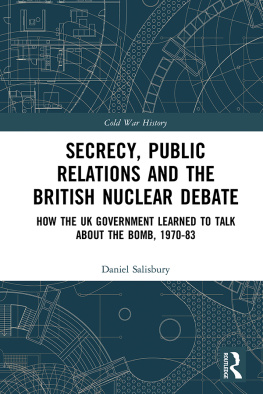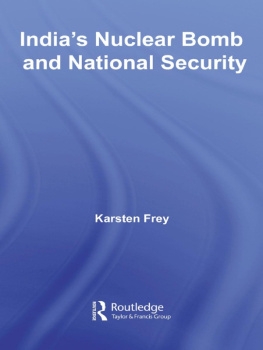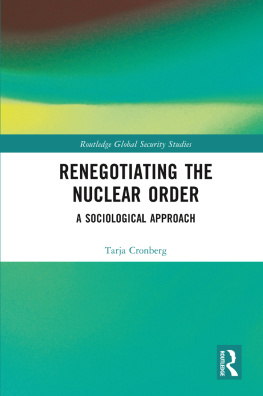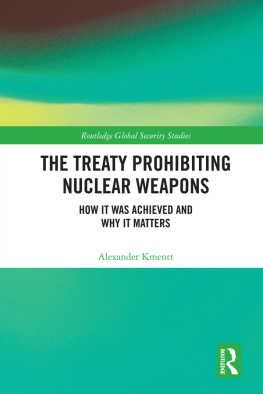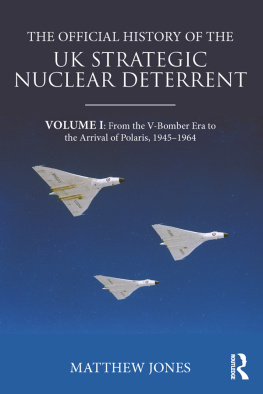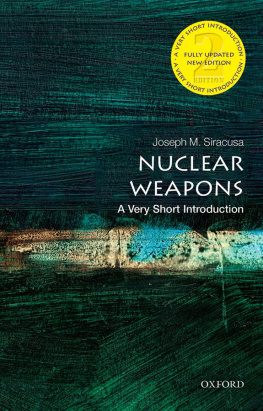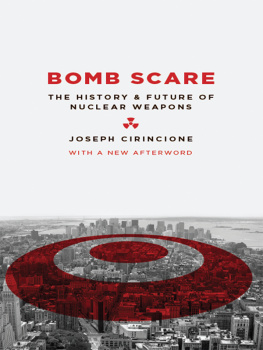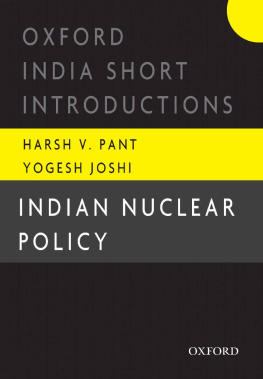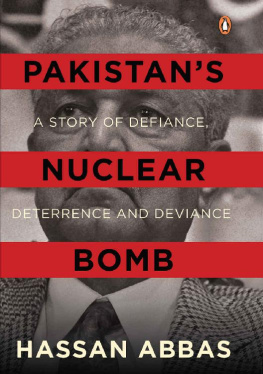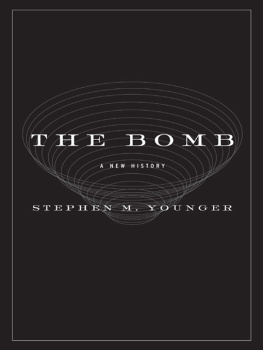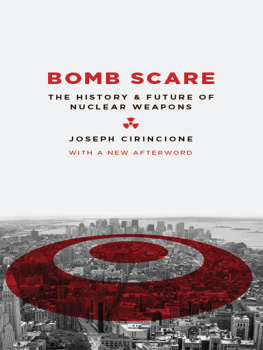Stanford University Press
Stanford, California
2014 by the Board of Trustees of the Leland Stanford Junior University.
All rights reserved.
No part of this book may be reproduced or transmitted in any form or by any means, electronic or mechanical, including photocopying and recording, or in any information storage or retrieval system without the prior written permission of Stanford University Press.
Printed in the United States of America on acid-free, archival-quality paper
Library of Congress Cataloging-in-Publication Data
Gill, David James, author.
Britain and the bomb : nuclear diplomacy, 19641970 / David James Gill.
pages cm. (Stanford nuclear age series)
Includes bibliographical references and index.
ISBN 978-0-8047-8658-4
. Nuclear weaponsGovernment policyGreat BritainHistory20th century. 2. Great BritainForeign relations19641979. I. Title. II. Series: Stanford nuclear age series.
UA647.G55 2014
355.02'170941dc23
2013017258
ISBN 978-0-8047-8858-8 (electronic)
Typeset at Stanford University Press in 10/14 Minion
BRITAIN AND THE BOMB
Nuclear Diplomacy, 19641970
David James Gill
STANFORD UNIVERSITY PRESS
Stanford, California
Stanford Nuclear Age Series
General Editor, Martin Sherwin
ADVISORY BOARD
Barton J. Bernstein and David Holloway
For Gemma, Michael, Mum and Dad
Contents
Acknowledgments
Portions of the text have appeared in the following articles: The ambiguities of opposition: Economic decline, international cooperation, and political rivalry in the nuclear policies of the Labour Party, 19634, Contemporary British History 25:2 (2011), 124; Strength in numbers: The Labour government and the size of the Polaris force, Journal of Strategic Studies 33:6 (2010), 81945; Ministers, markets and missiles: The British government, the European Economic Community and the Nuclear Non-Proliferation Treaty, 196468, Diplomacy and Statecraft 21:3 (2010), 45170. I am grateful to Taylor and Francis for allowing me to reproduce my research in this book.
Thank you to everyone who helped me to produce Britain and the Bomb. I am especially grateful to Michael S. Goodman, Peter Hennessy, Peter Jackson, Andrew Priest, Thomas Robb, and Len Scott for reading and reviewing earlier drafts. Their advice made the book considerably better. Special thanks to Stanford University Press. John Feneron, Martin Hanft, Emma Harper, Norris Pope, Marty Sherwin, and Stacy Wagner have all been incredibly helpful throughout the publication process. Support from the Lyndon Baines Johnson Presidential Library, the Royal Historical Society, and Aberystwyth University facilitated much of my research in Britain and the United States. This book was only possible because of their generosity. My friends in London, Bristol, and Aberystwyth deserve considerable thanks for their kindness throughout the many years of researching and writing the book. Most important, thank you to my family for their unconditional support and tireless patience. I give my deepest thanks to Gemma, Michael, Mum, and Dad. I dedicate this book to them, with love and gratitude.
DJG
Abbreviations
The following abbreviations are used in the main text
ABM
Anti-Ballistic Missile
ACDA
Arms Control and Disarmament Agency
ANF
Atlantic Nuclear Force
BAOR
British Army of the Rhine
CDS
Chief of Defence Staff
CND
Campaign for Nuclear Disarmament
CTBT
Comprehensive Test Ban Treaty
DEA
Department of Economic Affairs
DOPC
Defence and Oversea Policy Committee
EEC
European Economic Community
ENDC
Conference of the Eighteen-Nation Committee on Disarmament
Euratom
European Atomic Energy Agency
FCO
Foreign and Commonwealth Office
FO
Foreign Office
FRG
Federal Republic of Germany
IAEA
International Atomic Energy Agency
IMF
International Monetary Fund
MLF
Multilateral (Nuclear) Force
MOD
Ministry of Defence
MP
Member of Parliament
NATO
North Atlantic Treaty Organisation
NDAC
Nuclear Defence Affairs Committee
NPG
Nuclear Planning Group, NATO
NPT
The Treaty on the Non-Proliferation of Nuclear Weapons
NPWG
Nuclear Planning Working Group, NATO
OPD
Oversea Policy and Defence Committee
PAL
Permissive Action Links
PLP
Parliamentary Labour Party
PRC
Peoples Republic of China
PTBT
Partial Test Ban Treaty
PWG
Paris Working Group
SLBM
Submarine Launched Ballistic Missile
SSBN
Ship Submersible Ballistic Nuclear
UK
United Kingdom
UN
United Nations
USA
United States of America
USSR
Union of Soviet Socialist Republics
Introduction
PRIME MINISTER HAROLD WILSON suffered many disappointments in his first two terms of office. The devaluation of the pound, the retreat from global defence commitments, and the failure to achieve membership of the European Economic Community overshadowed much of his premiership. Wilsons occasionally disingenuous explanations of these misfortunes, coupled with a raft of unfulfilled domestic promises, encouraged little sympathy for the plight of his government. Perhaps most damning of all was the scepticism in British politics that his first two terms engendered. These ignominies, however, should not obscure a considerable record of achievement in international negotiations concerning nuclear weapons. Indeed, under Wilson, British nuclear diplomacy enjoyed much success.
Wilsons first two governments, beginning in October 1964 and ending in June 1970, represent a critical period in international nuclear history. By the close of 1968, the Labour government had signed and ratified the Treaty on the Non-Proliferation of Nuclear Weapons. A little over a year later, the treaty came into force, marking an important step towards a world with fewer nuclear weapon states. More than four decades later, the treaty still frames British, European, and American non-proliferation efforts. Preceding this historic feat was another. In 1966, Britain became one of the founding members of the Nuclear Planning Group. The United States, Britain, West Germany, Italy, and three rotating members would share decision-making on nuclear policy in the North Atlantic Treaty Organisation. Despite the end of the Cold War, the group remains the ultimate authority within NATO concerning nuclear policy issues.
British nuclear diplomacy in this period involved more than international agreements. Wilson was the first prime minister to overcome serious pressure to surrender nuclear independence. Beyond calls for disarmament from within the Labour Party, the key challenge to independence came in the form of foreign demands to collectivise British nuclear weapons into a multilateral nuclear force. Under Wilson, the Labour government successfully resisted international pressure to share its nuclear weapons with other NATO members. This diplomatic challenge, unique in British nuclear history, faded away with no diminution to the countrys own nuclear status. The independence of Britains nuclear force today, and the enduring absence of a German or European deterrent, owes a debt to Wilsons handling of nuclear diplomacy more than four decades ago.


